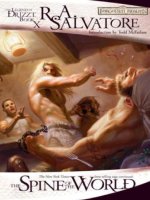WORLD BOOK WORLD BOOK WORLD BOOK 0148 0148
Bạn đang xem bản rút gọn của tài liệu. Xem và tải ngay bản đầy đủ của tài liệu tại đây (1.05 MB, 1 trang )
upon himself or his acquaintances. That distinction, however, is not well known or accepted by non-wizards; they
distrust any employment of magic, and rightly so.
Afflictions
Sorcerous energy descends upon the offending wizard in
many forms. The most common of these are the afflictions.
These seemingly natural occurrences appear suddenly,
their root cause not immediately apparent. A victim might
never guess an extradimensional awareness has chosen
her to suffer, attributing the affliction to more mundane
causes. Sorcery leaves no trails, but those familiar with how
it deals out its displeasure can recognize signs, which many
call curses or hexes. Regardless, the wizard suffers personally and socially for dabbling in magic as long as her hateful nemesis deems it appropriate.
All afflictions below are noted from most to least common in occurrence.
Personal Afflictions
Primarily, the afflictions warn a wizard to “stop tinkering with power you do not fathom.” Alas, they are warnings oft ignored. A wizard who throws caution to the
wind and continues casting magical spells risks much,
as multiple afflictions may befall him at the same time,
and cumulative effects may be crippling. Also, multiple
afflictions can become permanent. A wizard who heeds
the warnings and sets his magic aside while afflicted
protects himself against life-long disabilities.
Physical Irritation: The spell caster’s skin itches, pain
coming in waves all over the body. Wherever scratched,
skin becomes raw and painful or possibly bleeds. The face
grows flush and the scalp flakes and cracks, leaving open
sores. Soles of the feet and palms of the hands become
heat-sensitive and are constantly too hot or too cold. A
wizard is forever scratching with fingernails or any tool at
hand, seeking relief by salves, lotions, baths with strange
salts, or many foul-smelling or greasy folk remedies.
Pain: The wizard is beset with unnatural, occasionally debilitating pain. Exact symptoms vary in type and severity.
He feels like needles stab at his skin or fire licks at him. His
throat and lungs burn or his ribs and spine ache as if they
are twisted or crushed. Internal organs burn or roil intensely enough to make him double over. Sharp pains run along
his limbs or digits, sudden enough to make him jump. Stabbing headaches make it almost impossible to concentrate,
forcing him into the darkest space, rubbing his temples in
a vain hope that they will leave him be. The wizard might
seek compresses or even ice to ease his discomfort.
146
Non-debilitating Sickness: The wizard becomes nauseated and aches as if he suffered a common flu. He feels
weak and feverish, sweating but shivering at the same
time. The symptoms are real enough that it is difficult
to hold food down and appetite is dampened, keeping
the victim weak and fatigued. The same remedies that
ease a real sickness can ease a wizard somewhat, but this
phantom sickness will pass only when sorcery finishes
punishing the wizard.
Sores and Lesions: Grotesque weeping blotches appear upon a wizard’s face, arms, or other flesh. Pus and
gore stain the skin and clothes. Not just painful, the
blotches itch and smell of rotting eggs and flesh. Others
find them more repulsive and fear the affliction to be
contagious, often driving a wizard out of the community lest an epidemic set in.
Phobias: Sorcery’s displeasure fosters genuine, deepseated fear in an unwary wizard’s soul. It amplifies existing phobias by crippling degrees. Someone fearful of
heights becomes unable to manage his anxiety, avoiding even casual elevations and worrying about climbing
stairs, hills, ladders, and so on. One disturbed by public
speaking may soon be unable to face even conversation
among friends to the point of hiding away and lying to
avoid the horrible exposure of it. New phobias emerge
that are difficult for a wizard to avoid, such as fears of
books or study, or all-too-understandable fears of miscasting a spell.
Hallucinations: The wizard sees all manner of things in
his waking state that simply are not there. Dream creatures
follow him around or lurk where he goes. Ghosts and apparitions appear at random times. He sees roads where there
are none, friends where there are enemies, treasure where
there is trash. Most hallucinations are temporary and brief,
but some linger like phantoms, making the wizard appear
delusional and paranoid. Persistently pursued, the wizard
questions his own intellect and must fight to disbelieve
these illusions lest he give into them and disappear himself into a nightmare world of the unreal.
Depression: Many wizards begin as withdrawn, selfdoubting figures. Angered sorcery knows how to twist
thoughts to drive one further into personal gloom. It digs in
deep, exhuming every slight, sneer, or ridicule ever heaped
upon a victim and multiplies them incessantly to make
them worse still. The wizard questions his mastery of his
Craft and his very existence, bullied by unseen forces eager
to drag him down, to the brink of destruction. Wizards so
tormented succumb to their darkest thoughts, avoid others
and their tasks, and wallow in mental mire.
Nightmares: Sorcery invades the wizard’s slumber, filling his mind with terrible, haunting images that rob him
of deep sleep and peace of mind. The wizard now experi-









